Before setting off on your next adventure, check out our 10 easy tips and tricks for helping to avoid food poisoning
What is Food Poisoning?
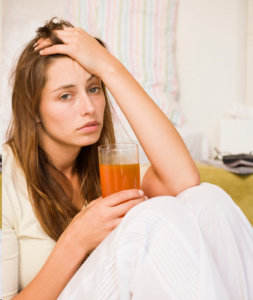
Food poisoning is an illness that results from eating contaminated food which is carrying bacteria, viruses, parasites or chemical toxins. It can cause a range of symptoms, including stomach pain, diarrhoea, nausea, vomiting, and fever often within several hours to a couple of days. The severity of the symptoms depends on the type of bacteria or other contaminants that caused the food poisoning, the person’s age, overall health, and how much of the contaminated food was consumed.
Usually these contaminants get into food through means, such as poor hygiene practices during food preparation, poor storage conditions that allow bacteria to grow and contact with bad water. Thankfully these risks can be managed through common sense and sensible risk management
1. Eat at venues where food is cooked fresh and has a high turnover
Meals and ingredients which have been sitting out all day are the perfect environment for bacteria to grow and prime candidates for making you sick. Bacteria doubles every 20 minutes at room temperature.
When choosing a place to eat, observe if they are making it fresh for each customer and actively going through the ingredients or if the meal was precooked and prepared earlier.
2. Eat where the locals eat
It may seem simple but this is one of the tips you can follow while travelling! Not only are you likely to have a more authentic and budget-friendly experience, but locals are far less likely to go to the same restaurant again if they have been sick there before.
If a restaurant is empty and the one next-door is full there is probably a very good reason why.
3. Steer clear of street vendors without a cooler or fridge
The lack of a cooler is a big red flag that food is not being stored correctly, be it at the correct temperature or susceptible to picking up contaminants like dust from the environment.
Good long-term street vendors will invest in equipment like coolers and separate sealed containers for each ingredient. They are also far more likely to be aware of safe food handling techniques like a clean cooking area.
4. Wash your hands and wipe down the table, any chopsticks, silverware, and glasses
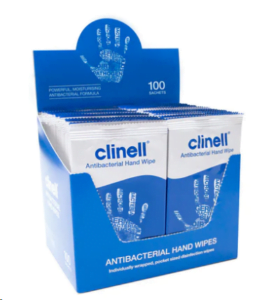
While it may look daft and signal to any spectators that you’re a paranoid germaphobic you should not be trusting when it comes to the cleanliness of your eating utensils in many parts of the world.
In many cases they have been sitting there all day through multiple customers and you have no guarantee on how well they were cleaned (ie with hot water/ detergents) since the last person used them.
If drinking from a tin or bottle it’s also worth giving it a quick clean too.
When travelling I always carry a few sachets of unscented disinfecting wipes in my backpack to do a once-over be it toilet seats, aircraft tray tables, table and shoes.
I’ve always had good luck with Clinell Antibacterial Hand Wipes Moisturising Antibacterial Wipes which are individually wrapped making them easy to carry, don’t burn the skin off my hands with crazy chemicals and don’t smell like a hospital.
5. Be careful of fresh fruit and vegetables
Contrary to what your parents told you, fruit&veg can actually be very unhealthy if you are not careful!
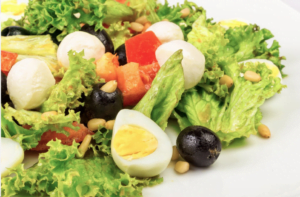
Warm moist environments are a breeding ground for Salmonella, E. coli and Listeria bacteria which will certainly ruin your day, to add to that your fresh salad or fruit had a high likelihood of being washed down with tap water which can be equally as bad.
The best defence is to have your greens as a soup or other cooked meal. This is because most (not all) foodborne bacteria can be neutralised with heat above 60°c. Personally I’d steer away from cut-up fruit or vegetables and opt to wash down the full item (ie apple) myself with clean drinking water and cut it up myself.
If you can’t guarantee good refrigeration or if your meal is looking on the sorry side such as with mushy and browning lettuce leaves I’d give it a wide berth.
6. Ensure meat is properly cooked through
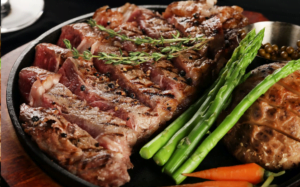
I’m not going to tell you how to eat your steak, but it is a damn sure good idea to make sure it’s been cooked enough to kill any harmful bacteria or parasites that may be present in it!
This temperature varies such as a recommended temperature of 63°C (145°F) for Beef, Lamb and Pork and poultry (chickens, duck, turkey) a slightly hotter 73°C (165°F).
While I wouldn’t expect anyone to pull out a meat thermometer, a few good ways to confirm this are:
- Check the colour: Cooked meat should be a uniform colour throughout, rather than pink or red in the centre. This is particularly true for chicken which should always be cooked through.
- Check the texture: Cooked meat should be tender and should easily pull apart or cut with a fork.
- Check the juices: Cooked meat should release clear juices when cut or poked, rather than large amounts of pink or red blood
If you’re unsure or not happy with how a meal is cooked, politely ask the staff to put it back on the stove for a few more minutes.
This also applies to eggs which if cooked properly will kill the Salmonella bacteria. Most eggs in developed countries are pasteurized before purchasing as part of the packing process, your fresh egg’s bought at a market in rural Thailand are likely not!
7. Don’t eat the fish!
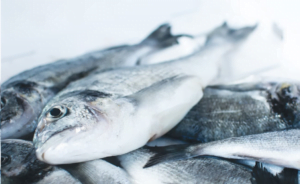
Eating fish in developing countries is the food equivalent of Russian Roullet.
One of the main risks of eating fish is ‘Histamine’ (scombroid poisoning). After a fish has been caught and subsequently dies, naturally occurring bacteria starts converting the amino acid’s in the fish muscle tissue to histamine.
In large amounts, such as if the fish is caught in warm environments or if the fish was not kept properly refrigerated during its journey to your dinner plate the levels of histamine can become toxic.
Unlike other types of bacteria, heat does not destroy Histamines and can make it worse. Always ensure fish is fresh and stored on ice (not frozen solid), be very sceptical about eating fish in developing countries if you are not near the sea or major river!
Symptoms of Histamine typically occur within 30 minutes and include
- Tingling in the mouth and throat or a peppery taste
- Facial flushing and rashes
- Sweating, headaches, nausea and vomiting
- blurred vision and dizziness in severe cases
Most people recover without treatment after several hours however don’t hesitate to seek medical assistance for severe life-threatening symptoms including breathing issues or if symptoms do not subside
Another major risk is eating fish from polluted waterways which can contain a variety of contaminants, including chemicals, pesticides, heavy metals, and bacteria, that can accumulate in the flesh of fish and make them dangerous to eat.
If the waterways in the area look sketchy you really should just stick with the chicken!
8. Only drink bottled water and carbonated drinks

In many countries water quality can be a major issue due to infrastructure for treating and distributing drinking water not being up to scratch. This can lead to contaminants such as bacteria, viruses, and chemicals ending up in the tap water leading to illness.
Always do your research and talk to the locals if the water is safe to drink. If your hotel has bottled water left out on the counter this is a big hint that it is not.
If there are doubts about the water, buy bottled water from a reputable place and avoid ingesting tap-water from sources such as ice or fresh uncooked food washed down from it. When brushing your teeth rinse the toothbrush using bottled water.
9. Pack some medication
Several countries including India, Egypt, Turkey and Indonesia have reputations for food poisoning for even experienced travellers. If travelling to areas where you have a good chance of getting sick have a chat with your chemist and GP on what they recommend.
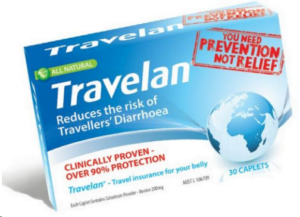
Many travellers swear by Travelan which is an over-the-counter medication taken before meals that targets the gut and can reduce Travellers’ Diarrhoea. While it won’t stop you from getting food poisoning it may reduce one of its worse symptoms.
Another medication worth packing is ‘Ondansetron’ which is effective at treating nausea. Depending on what part of the world your in you may need a prescription.
One thing not to skip is rehydration electrolytes supplements like Hydralyte. Not only can it help with hangovers but can replenish key electrolytes that may have been lost during vomiting or diarrhoea due to viral or bacterial stomach infections.
10. Get Travel Insurance Before You Travel
Fear of a huge bill should not be a factor of seeking medical attention. Severe food poisoning can be fatal in extreme cases and can require strong prescription antibiotics. Even straightforward cases can cost thousands depending on the clinic and tests ran.
Good policies not only cover your medical bills but may also compensate you if you need to cut your trip short or miss out on pre-booked activities.
Always read the inclusions and exclusions of your policy before leaving the country.
You should seek medical attention if:
- you still have symptoms after 3 days, or your symptoms are very severe
- you still can’t keep any fluids down, more than 24 hours after getting sick
- there is blood or mucus in your vomit or diarrhoea
What tips do you have for avoiding falling ill while travelling? Let us know in the comments below
All products and services are recommended are carefully selected, some of our articles include affiliate links. If you buy something through one of these links, we may earn a commission, at no cost to you